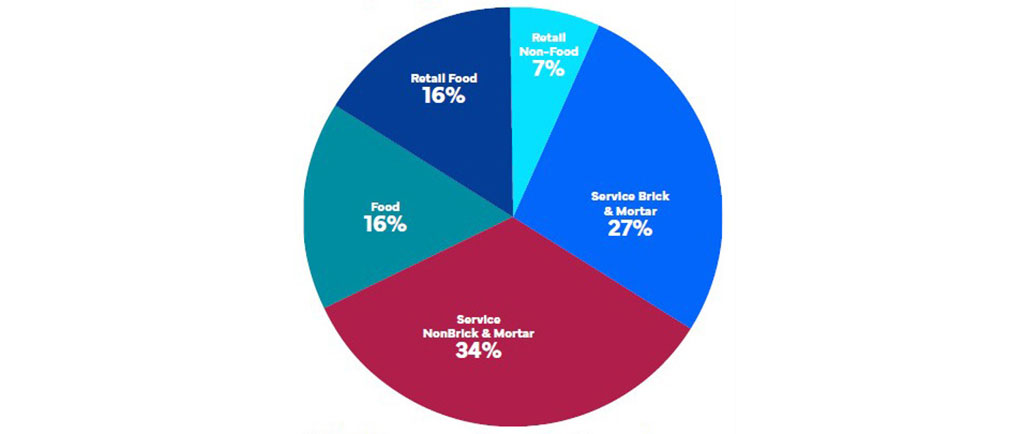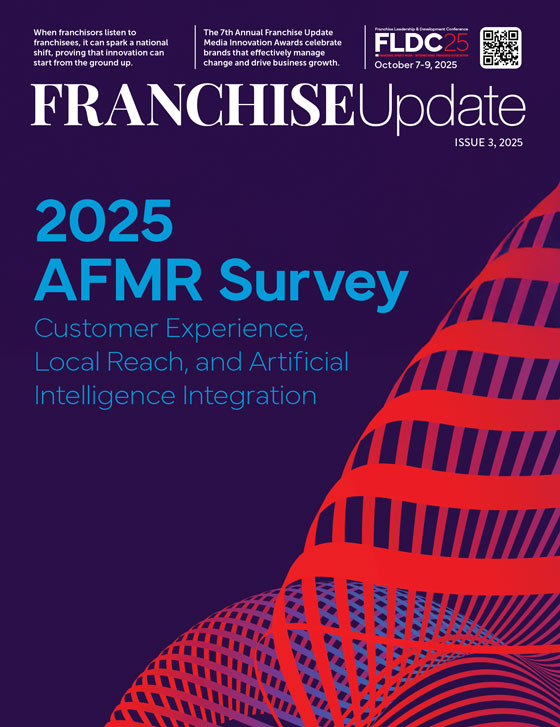From Differentiator to Driver: 2025 AFMR Findings Reveal Franchises Leaning into CX, Local Reach, and AI Integration

Customer experience (CX) is having a moment.
No longer just a differentiator, CX is the engine driving growth and resilience as franchisors look to harness the power of their brands like never before.
The 2025 Annual Franchise Marketing Report (AFMR), presented at this year’s Franchise Customer Experience Conference (FCXC), reveals brands are doubling down on innovation to stay ahead at a time when reputation is everything, AI is delivering real value, and seamless CX demands system-wide teamwork.
In its seventh year, the AFMR uncovers how franchise brands are future-proofing their businesses. This year’s findings dive deeper than ever into the evolving role of CX leadership, the operational impact of AI, and the tangible results marketers are achieving with smart tech investments.
Diane Phibbs, Franchise Update Media’s chief content officer and EVP, presented a high-level overview of the report to FCXC participants attending the June conference in Atlanta.
One key takeaway emerged right away: AI isn’t just hype anymore. Forward-thinking franchises are leveraging tech-fueled strategies to unlock efficiency, personalization, and strong customer connections.
Participating brands

With CX now center stage, franchise marketers are navigating a complex landscape to optimize their reach to consumers and business clients. This year’s AFMR includes the perspectives of a diverse industry mix. Franchise executives, including CEOs, presidents, CMOs, and other senior leaders in marketing, operations, and technology, provided input on budgets, strategies, and operational practices through detailed questionnaires.
Among them, 65% of respondents represented business-to-consumer (B2C) brands with 6% exclusively targeting business-to-business (B2B) audiences. A significant portion, 29%, engages with both groups.
Similar to previous years, service brands accounted for the majority (61%) of respondents. Among these service-based franchisors, 34% of marketers were territory-based, without a physical storefront, while 27% represented traditional brick-and-mortar businesses.
Another 32% of those surveyed worked for food brands (16% food and 16% retail), and the remaining 7% worked in non-food retail.
Leads and traffic count

Despite the economic rollercoaster of the past year, the latest AFMR findings show the industry’s continued resilience.
When Phibbs took the stage to share the results, she began with an encouraging statistic: Nearly 80% of respondents are seeing stable—and even growing—lead generation and customer traffic. Almost four in 10 businesses (39%) reported an uptick in leads and traffic, and a similar share (38%) said levels are holding steady.
“I think our industry is responding well to what’s going on in the world,” Phibbs observed.
Of course, not every business is riding the wave. About 21% experienced a dip in leads and traffic compared to the previous year, and a small fraction (2%) were unsure about their current standing.
Marketing spend

Franchise marketers continue to bet big on digital in 2025 with survey respondents reporting that digital ads account for 42% of total marketing budgets. Social media follows as the second-biggest player, claiming 22% of spend, proving influencers and targeted campaigns aren’t going anywhere.
While marketing remains a digital-first game, traditional channels like print ads (8%) and broadcast TV/radio (7%) are holding their ground. Meanwhile, streaming TV/radio (7%) now matches the slice of the pie held by legacy broadcasts.
Brands are also keeping it local. Community events (7%) and direct mail (3%) show franchises haven’t forgotten the power of hometown connections. And while PR (8%) and websites (12%) may not be the flashiest line items, they remain critical to reputation and lead generation.
Among digital sources, search engine pay-per-click campaigns and social media ads are top priorities for marketing spend. The survey shows 36% of franchise marketing budgets are allocated toward search engine PPC, and another 29% is funneled into social media advertising.

Local spend

Local is no longer a growth option. The AFMR found a whopping 85% of respondents recognize the power of local marketing to drive customer connections, recommending or requiring their franchisees to invest in local marketing spend. But nearly half (48%) leave it to their franchisees to independently track and manage this effort.
Experts say this hands-off approach could mean missed opportunities and wasted spend. “We know how critical it is to engage at the local level,” Phibbs said. “So, is that really the best way to do a local marketing program?”
Phibbs went on to push franchise leaders to rethink local marketing efforts. “Do you have a local component to all of your new campaigns, new products, and promotions?” Phibbs said. “And how are you executing these local marketing programs? Are you feeding franchisees the information, tools, and resources that they need to engage and execute effectively in their markets?”
Who owns CX?
Today’s top franchisors understand that CX is everyone’s job. Every brand surveyed reported having a formal process or model in place for measuring CX, underscoring its growing cross-functional prominence across marketing, operations, and technology departments.
For nearly half of the AFMR’s participants, CX has become a collaborative mission with the customer experience of 47% of brands managed by multiple departments. That’s a significant leap from previous years. The other 53% breaks down as follows:
- 35% look to operations and training teams.
- 10% rely on the CEO.
- 8% assign CX to marketing.
CX/online reputation

Online reputation is no longer just about damage control; it’s the front line of customer experience and loyalty. This year’s AFMR explored the importance of measuring and understanding the intersection of CX and reputation.
Online reviews dominate: A whopping 90% of brands now actively monitor online reviews, up from 75% just a year ago (2024 AMFR study).
Social listening is also critical. Brand mentions, conversion rates, website traffic, engagement metrics, and sentiment analysis round out the top tracking priorities.
In addition, 68% of those surveyed rely on review monitoring platforms, and 59% use social media monitoring tools. The use of online reputation management platforms and SEO tools ties at 38% with sentiment analysis gaining traction (22%).
Reputation at scale

When it comes to managing online reputation at scale, franchise brands are taking different paths, but the stakes are the same. According to 2025 AFMR data:
- 55% kept it in-house.
- 20% outsourced to a third party.
- 18% put franchisees in charge
- 7% used other approaches.
While most of those surveyed recognize the importance of online reputation, many remain stuck in reactive mode. When executives were asked to pinpoint their biggest CX and reputation hurdles, key challenges emerged:
- One-third of brands (33%) cite maintaining consistency in the customer experience across locations as their top challenge.
- Nearly as many franchises (32%) struggle with handling complaints and bad reviews, suggesting many lack a clear, brand-wide response strategy.
- 21% report struggling with two modern online headaches: keeping up with constant platform algorithm changes (Google, Yelp, Meta) and monitoring the online moves of competitors.
- 14% of franchise marketers cited crisis management as a top issue.
Local reviews and social buzz don’t just impact a single location; they have the power to shape perceptions of an entire brand. With more customers than ever making decisions based on digital word of mouth (95% of consumers read online reviews before making decisions, according to statistics compiled by Shapo.io), marketers need a unified strategy to track, respond to, and improve reputation management at scale.
The disconnect in the AFMR data shows there’s still work to be done. While a majority of brands invest in corporate-run online reputation management, nearly half (48%) leave local marketing management to their franchisees.
Phibbs encouraged franchise leaders to consider outsourcing marketing challenges, including reputation management, to experts and reallocate those corporate resources to the local level.
“If you’ve got your franchisees doing effective local marketing programs, that’s going to drive royalties to pay for the resources to execute the programs and help ensure that your franchisees are doing what you want them to do,” Phibbs said.
AI and CX
This year’s AFMR continues to put AI under the microscope with expanded findings that reveal both excitement and growing pains. The message is clear: AI isn’t just a passing trend. It’s transforming the franchise industry—ready or not.
The report found that 60% of franchise brands now use AI to enhance customer experiences, up slightly from 57% last year, with 75% planning future investments.
But that still leaves 40% on the sidelines. The gap could soon separate early industry adopters from the pack.

Franchisors are growing more confident in the ability of their teams to deploy AI effectively. Respondents reported the following strategies most in play:
- Chatbots and virtual assistants
- AI-driven marketing campaigns
- Personalized customer interactions
- Predictive analytics
- AI-powered loyalty programs
Year-over-year AI impact

These moves appear to be paying off. For the second straight year, the AFMR tracked how franchise marketers are leveraging AI, and the results show real progress:
• 43% reported greater efficiency in customer service, more than double the 20% reporting benefits in 2024.
• 38% saw improved customer satisfaction scores, compared to 33% in 2024.
• 35% achieved better personalization, up from 23% in 2024.
• While customer inquiry resolution efficiency dipped to 32% from 43% in 2024, engagement rates surged to 32% compared to 17% in 2024
AI roadblocks

Despite AI’s promise, adoption across multiple locations isn’t always smooth. The biggest reported hurdles include:
• 53% struggle with system-wide integration.
• 47% cite a lack of skilled personnel.
• 30% worry about data privacy and security.
Other concerns include unreliable tech (23%), franchisee/customer resistance (16%), and high implementation costs (14%).
Measuring AI success
Franchise marketers report the use of multiple data-driven strategies to assess AI’s effectiveness:
• 56% monitor customer feedback and reviews.
• 48% track KPIs.
• 26% rely on engagement metrics and satisfaction surveys.
While the industry adoption of AI tools for marketing is still in its early stages, the survey found a notable openness to invest in new technologies and a recognition of the need for ongoing training and support for franchisees.

The future is now.
“AI is here. It’s not going anywhere,” Phibbs emphasized, echoing AI futurist Steve Brown’s message in his keynote to FCXC attendees. Drawing from her restaurant background, she offered the timeless management advice to “inspect what you expect.”
“If you expect that your AI programs are going to integrate into the way you do business or help you change the way you do business, it would be advantageous for you to step back and take a look at what your technology staff looks like today and make sure you’re ready,” Phibbs said.

The Road Ahead
Franchise brands that are breaking down silos to enhance CX, embrace innovation, and keep the customer at the center will lead the next wave of growth.
Insights from this year’s AFMR reveal franchisors must prioritize both robust CX strategies and the thoughtful integration of AI while ensuring their teams and local franchisees have the necessary resources and training to succeed. Experts say the brands that will thrive are those that merge tech with a people-first mindset.
Key AFMR Recommendations for Franchise Leaders
- CX should be a shared, strategic priority across marketing, operations, and technology departments.
- Use AI to enhance, not replace, human interactions.
- Empower franchisees with training, tools, and a seat at the table.
- Invest in measurement, feedback, and reputation management to drive continuous improvement.
- Support local marketing as a driver of both traffic and revenue.
- Prepare your organization for ongoing change; reskilling or upskilling is not optional.
Share this Feature
Recommended Reading:
| ADVERTISE | SPONSORED CONTENT |
FRANCHISE TOPICS
- Multi-Unit Franchising
- Get Started in Franchising
- Franchise Growth
- Franchise Operations
- Open New Units
- Franchise Leadership
- Franchise Marketing
- Technology
- Franchise Law
- Franchise Awards
- Franchise Rankings
- Franchise Trends
- Franchise Development
- Featured Franchise Stories
FEATURED IN

Franchise Update Magazine: Issue 3, 2025
| ADVERTISE | SPONSORED CONTENT |








 The franchise listed above are not related to or endorsed by Franchise Update or Franchise Update Media Group. We are not engaged in, supporting, or endorsing any specific franchise, business opportunity, company or individual. No statement in this site is to be construed as a recommendation. We encourage prospective franchise buyers to perform extensive due diligence when considering a franchise opportunity.
The franchise listed above are not related to or endorsed by Franchise Update or Franchise Update Media Group. We are not engaged in, supporting, or endorsing any specific franchise, business opportunity, company or individual. No statement in this site is to be construed as a recommendation. We encourage prospective franchise buyers to perform extensive due diligence when considering a franchise opportunity.